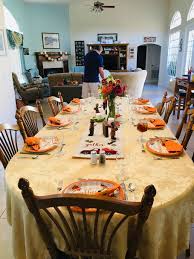
So much promise, so little to show for it. One’s potential as a niece or nephew depends solely on the number of siblings one’s parents have. Perhaps some count a spouse’s aunts and uncles as one’s own, but I don’t see it. While relationships with aunts and uncles continue throughout mutual lifetimes the prime time, in my estimation is in one’s youth, well before one could possibly have a spouse. So, let’s start with a head count. Between them my parents had five siblings, all brothers. Uncle and, perhaps, spousal Aunt possibilities abounded.
So it starts with a headcount. Between them my parents had five siblings. All brothers. Uncle and, perhaps spousal Aunt possibilities abounded . . . . Alas
Alas, I think one must refine one’s list to exclude such possible uncles and aunts who are not alive when one is born. Uh oh.
My mom emigrated from a small village in Italy, arriving aboard the steamship Patria in New York on March 30, 1916.*
The Patria
She was not yet two years old, so she would not have realized that her mom was pregnant. Vittorio arrived, by birth not ship, twelve days later. My sisters and I had never known that Mom had any siblings until just after her death. Going through her possessions my sisters discovered a locket with a picture of two young children inside, Mom and Vittorio as it turned out. But by May, 1917 Vittorio was dead. Bronchial pneumonia as a complication from measles.*
But then, in June 1921, Antonio was born. Mom might not have remembered Vittorio; she was not yet three years old when he died, but she was close to seven when Antonio was born. And when he died, two-and-a-half months later. Tubercular peritonitis. The same disease that would take her mother four months later. Antonio’s death certificate* makes clear that he had contracted the disease in utero. And by surviving him her mother had to bear the grief of his death in her final months knowing that the cause of his death was her last illness.
My dad’s family also knew the early loss of a child. Louis, born in 1923, died that same year of complications from spina bifida. But three sons born earlier survived childhood, my dad (right) and two other brothers, Tom (left), a year older than Dad, and Carl, Jr.,(center) called “Babe”, two years younger.**
But. Tom had contracted rheumatic fever as a child. He recovered, but as a direct result of that illness suffered from a kidney disorder, Bright’s Disease (chronic nephritis). He lived with it for a number of years, long enough to graduate from college and law school at Cornell. After law school graduation in 1938 he studied for and successfully completed the New York bar exam and commenced a solo practice. His mother, my grandmother, served as his secretary. As Dad tells the story, he settled an estate that produced enough of a fee for him to pay off his college and law school debts. And in the fall succumbed to his disease. Not yet 25.
I think my dad never got over losing his brother. I mentioned last week (Memorabilia prompt, “Lost and Found”) that Dad’s mother’s family tradition was to name the first-born son Thomas, so it would appear that in my naming Dad just followed family tradition. But I think there was more to that. I’ve often wondered how it would have been to have known him as I grew up and especially thereafter as a fellow member of the Bar. But it was not to be.
So, then there was one. Babe married, Thelma, and they had two children. Bonanza! An aunt and uncle and two cousins. But there was an estrangement. My Dad never spoke of it. It just was. There was no communication. But I did meet my uncle. I was driving with Dad in my grandfather’s village – I was probably about nine years old – when Dad pulled the car over and an unfamiliar man came up to talk to him. It was Babe. I don’t remember that Dad introduced us. Probably did. And the encounter was brief. And never repeated.
When my grandfather died the summer before my senior year in college I was unable to attend his funeral because of my work schedule, so I missed an opportunity to properly meet Babe, as well as Thelma and my cousins. I remember my mother grousing about it afterwards, belittling them about this and that and the other. And “the penny dropped”. My dad’s hometown, not far from mine, was a small rural community. Thelma came from a small village in the North Country of New York, near the Canadian border. My mom was an Italian immigrant. For a time during World War II, when my dad was overseas, Mom and my sister Louise lived with Dad’s parents for a time, and Babe and Thelma lived in the same town. I have the feeling that at best she never felt welcome and more likely felt resented for her ethnicity, her religion and God knows what else. I don’t know specifics but I do know that Mom had “issues”, shall we say, perhaps many traceable to the loss of her mother and two brothers at a young age and her life with an emotionally distant father. My guess is the estrangement stemmed from her.
So, possible warm and loving relationships with multiple aunts and uncles was foreclosed by circumstance. “Collaterals” damage. But with a warmer ending.
I mentioned my Dad’s death in “Lost and Found”. I had come to his bedside from my home in Chicagoland, flying into Syracuse and renting a car. I was to return the same way. While I waited for my return flight I picked up a local phone directory to see if I could find Thelma’s telephone number. I knew she was in the area because, having taken care of my Dad’s financial affairs in the last years of his life I knew that he sent Thelma a Christmas card each year (thereby helping to confirm for me my supposition about the estrangement). I found it, and when I got home late that afternoon I called her. And we talked for forty-five minutes. I was so engrossed in the conversation that I hung up without telling her about and inviting her to the memorial service we intended to hold the following Saturday, so I called back to do so.
That weekend as my sisters and I and some of our children gathered with my step siblings and their families I hoped to finally meet Thelma. My sisters and I stood to one side as people entered, and it turned into a kind of receiving line. A woman I did not know, a contemporary, approached. “Tom, I’m your cousin Linda.” We hugged immediately and hung on to one another. Linda and I saw one another a number of times thereafter, and I continued to be in contact with Thelma, by cards, Christmas gifts and the like. But at Linda’s urging I left the timing of a physical reunion (reunion? The first time can’t be reunion, can it?) with Thelma. Linda told me that her mother had taken it very hard to be denied a relationship with her nieces and nephew, and needed some time. So I just waited. Until the day Linda called to tell me Thelma had died. Denied once more.
But although I never had the nephew experience I succeeded in uncleship. I enjoy the great fortune to have three nieces and a nephew, who I thoroughly enjoy. And the privilege of being a favorite Uncle. (Thanks, Lizzie)
– – – – – – – –
* The scope of genealogical materials accessible online is astounding.
** There is an astonishing resemblance between my son Tom and my Dad, between my son Charlie and Tom, and between my nephew Connor and Babe.
Retired attorney and investment management executive. I believe in life, liberty with accountability and the relentless pursuit of whimsy.


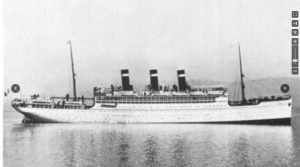
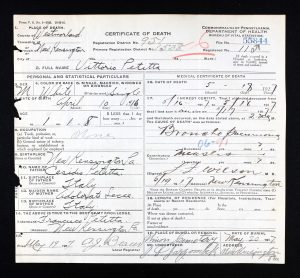
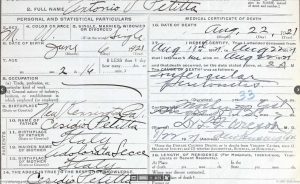
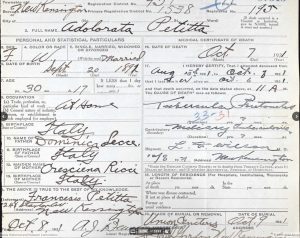
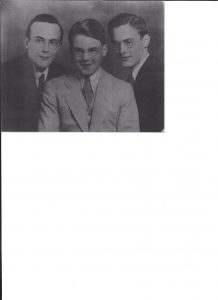
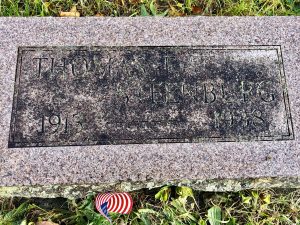

Thanx Tom, quite an American immigrant story and quite a family saga.
A friend once told me about her painful estrangement with her father, and how she had a chance meeting with him on the subway.
Familial relationships can be difficult indeed. I’m glad you’re now a treasured uncle yourself!
Thanks Dana
What a sad reality of just 100 years ago that children (and sometimes their parents) did not survive diseases. It’s a reminder that despite all that’s going on today, we in 2020 in the US have first world problems. I’m glad, Tom, that at least you had the opportunity to learn the stories behind some of the events with aunts and uncles you could not meet. Online records are indeed amazing, and one of these days I’m going to look for the manifest of the ship on which my grandmother and her family sailed to New York in 1906.
Thanks Marian
Yes, we take for granted (somewhat) that diseases that ran rampant even just 100 years ago are now largely things of the past (although some like measles may be making comebacks). And yes the wealth of info online is staggering. My mom and family emigrated in 1916. My grandfather made a solo trip in 1911, presumably to check things out. He stayed with a cousin on Mulberry Street in Manhattan (Little Italy). And he had $10 in his pocket when he arrived. (All found online). He and my grandmother came to check out New Kensington, PA, where they would settle in an Italian community, in 1913. Again all online.
How sad, Tom, that three out of your four uncles died long before you were born, and that Babe, the only surviving one, was someone you met once and never again. Sounds like you at least got a cousin, Linda, when you finally made contact with Babe’s family, but what a sad turn of events with Thelma never being ready to meet you before she died.
If you have the time (and inclination) this week, you could write another story about being an uncle, and tell us about your nephew and three nieces. I found writing my story about being an aunt very satisfying.
Thanks, Suzy. I think I’ll take you up on your suggestion. Must admit that re-experiencing the absence/loss of uncles and aunts wasn’t too pleasant.
Thank you, Tom. As others have noted, much of your story of sadness is of a time and place with early 20th century immigration, childhood illnesses and death and, more universally, family estrangement. You have told it all beautifully and I am glad that you have had the joy of being an uncle.
This has made me appreciate all the more how lucky I have been to have had a full array of aunts and uncles, even if a couple of the latter were real knuckleheads. (And I have myself known the recent sadness of losing a nephew way too young.)
Finally, your genealogical research is mighty impressive and the photos you have shared are fascinating.
Thanks, John. The research is indeed fun. I’m quite the puzzler (if memory serves, you are, too) and genealogical research is nothing so much as a multilayered puzzle. Re the aunts and uncles, it is what it is. I’m embracing Suzy’s suggestion so stay tuned.
I like puzzles, Tom, but others in the family do the genealogical heavy lifting. For my part, I just assume that the Mayflower took a little detour to Kiev en route to Plymouth and that’s how my family arrived.
Your story reminds me of the fragility of life in the early 20th century. So many losses, and so many children died very young. It is especially sad that there were no aunts or uncles on either side of your family except for Babe and Thelma, from whom your father was estranged. I think (hope) family feuds were more common in earlier generations. My mother and her sister didn’t talk to their older brother until just before he died, depriving me of a relationship with my cousins. Luckily, I did connect with one of them more recently, but that aunt and uncle were largely ghosts to me growing up.
Thanks, Laurie. I’m working on a “double dip” on this prompt, courtesy of Suzy’s suggestion. Stay tuned.
Your story really has me thinking about all the information you were able to glean based on selective oral family history and the scanty information contained in official forms. You say the scope is astounding, but imagine when (if?) future generations want to learn more about us, they will have TMI!
I’m sorry you was robbed — I mean were robbed, Tom, but I’m so glad you were able to turn things around by being a good uncle and even a favorite uncle. That goes a long way, as you might have gathered from my story.
Thanks, Barbara. And as I said to Laurie, stay tuned, “Talkin’ ‘Bout Whose Generation?” will appear soon at a Retrospect near you.
Tom, as others have already commented, you have reminded us of the fragility of life before modern medicine (and aren’t we seeing it played out again with no vaccine for COVID-19). As an aside, this is why I am truly puzzled by the anti-vaxxers.
But how sad for you to be robbed of several relatives by disease, then even more by estrangement. I’m told by my brother (who knows more about this than I do) that this was common among the immigrant generation, but I agree, this sort of stuff is appalling. I had something similar (though not quite as extreme) in my family. I was the one who reached out and ended hostilities begun by my grandparents, not allowing me to know second cousins, one of whom went to high school with me! You’ll read that story next week.
How very satisfying that now you have that part of the family back in your life and are even a “favorite” uncle! I look forward to reading the sequel to this story.
Thanks, Betsy. To clarify, though, my sense of the estrangement was likely much more a projection of my mom’s than real. Her family came at the end of the great wave of Italian immigration that started in the late nineteenth century. Theirs was regarded as a southern Italian family, darker, more foreign than those of northern Italy. And southern Italians were unwelcome. I wonder what she must have experienced growing up in suburban Pittsburgh. And good on you for being the bridge! I look forward to your story.